Alabama
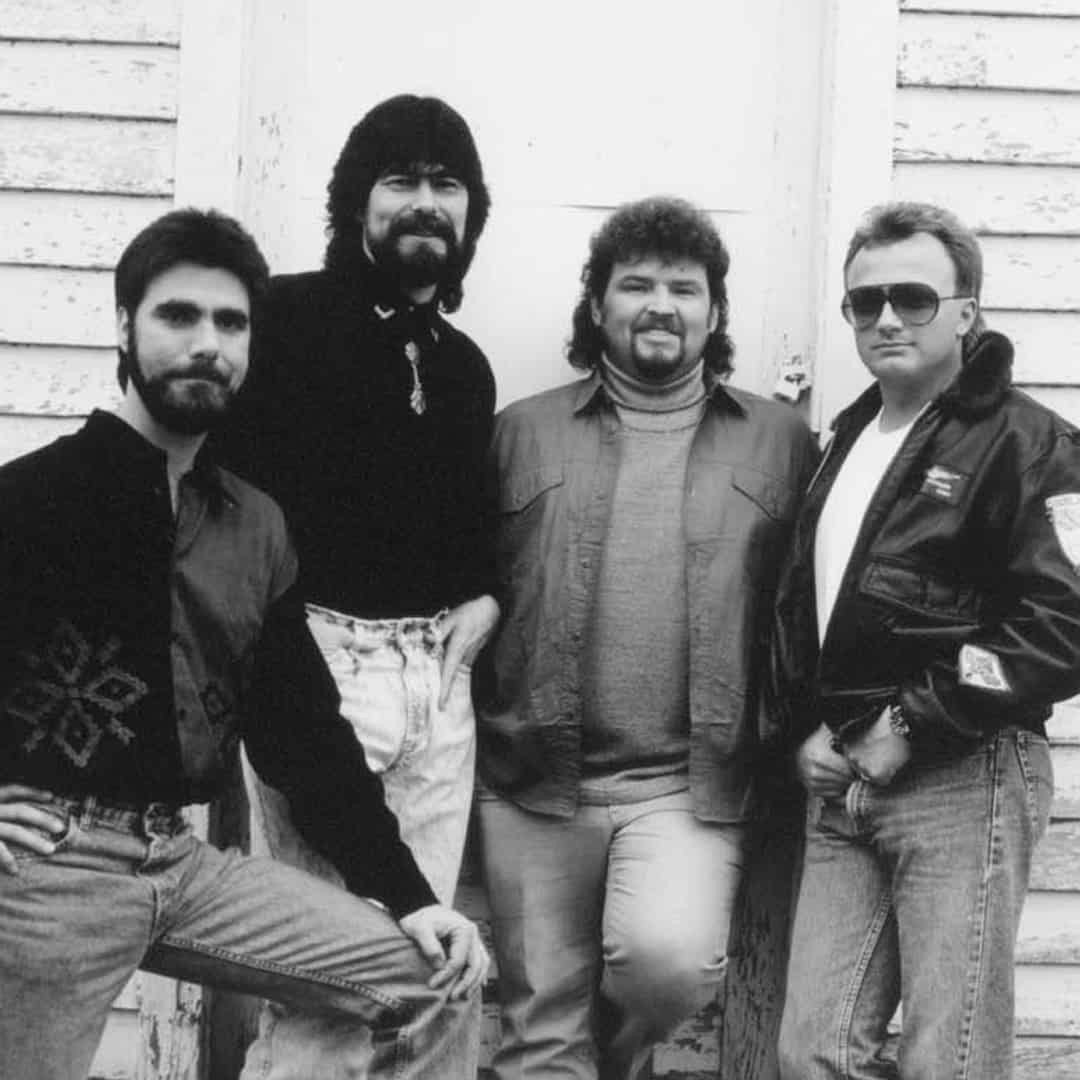
-
Inducted2005
-
Members:
- Jeff Cook
- Teddy Gentry
- Mark Herndon
- Randy Owen
Jeff Cook, 1949-2022
“Jeff Cook spent a lifetime in music, earning a license as a broadcast engineer before he was old enough to drive a car and working as an on-air radio personality while still in high school. He went on to fame, of course, with cousins Teddy Gentry and Randy Owen as a member of multi-platinum band Alabama, moving from barroom stages to sold-out arenas. Everything he did was rooted in his deep love of music, a love he shared with millions.”
—Kyle Young, CEO
Country Music Hall of Fame and Museum

Alabama proved that a self-contained, rock-style band could be a potent force on the country record charts and in concert.
Between 1980 and 1993, Alabama took more than thirty records to the top of the Billboard country chart and sold millions of albums, substantially broadening country music’s audience and making themselves one of American music’s most popular acts of all time. In contrast to vocal groups such as the Oak Ridge Boys and the Statler Brothers, the family-based act was a self-contained unit, playing instruments as well as singing—unprecedented for a country music band as successful as they were.
Professional studio musicians did contribute to Alabama’s records, but Jeff Cook (guitar), Teddy Gentry (bass), Randy Owen (guitar), and Mark Herndon (drums) provided their own accompaniment on the road, where legions of fans flocked to their shows. By adapting the rock & roll formula of the self-contained band to country music, Alabama opened doors for group acts who followed them, such as Lonestar, the Mavericks, Restless Heart, Sawyer Brown, and Shenandoah.
Their Home’s in Alabama
As teenagers, Cook, Gentry, and Owen, all born in Fort Payne, Alabama, formed a band called Wildcountry. The trio quit their day jobs in 1973, concocted their own potent blend of southern rock and country-pop, and began working show dates across the South. They particularly were favorites at the Bowery in Myrtle Beach, South Carolina.
Wildcountry changed its name to Alabama in 1977. Two years later, Cook, Gentry, and Owen hired rock & roll drummer Herndon on a permanent basis.
Alabama gained a toehold in the recording industry on the small GRT and MDJ labels in the late 1970s. Two Top Forty hits for MDJ, “I Wanna Come Over” (1979) and “My Home’s in Alabama” (1980), earned the band an invitation to play the “New Faces” showcase at Nashville’s annual Country Radio Seminar in early 1980—a performance that led to an RCA recording contract in April of that year.
Songs
00:00 / 00:00
00:00 / 00:00
00:00 / 00:00
Quick Success
Right from the start, Alabama hit the bullseye, scoring eight #1 country singles between May 1980 and August 1982. This impressive list included trademark numbers such as “Tennessee River,” “Feels So Right,” and “Mountain Music.” Along with “Feels So Right,” “Love in the First Degree” and “Take Me Down” also became Top Twenty pop hits.
Each year from 1980 through 1993, Alabama placed at least one single per year at #1 on the country chart, including “Dixieland Delight” (1983), “Forty Hour Week (For a Livin’)” (1985), “Can’t Keep a Good Man Down” (1986), “Song of the South” (1989), and “I’m in a Hurry (and Don’t Know Why)” (1992.
Alabama also recorded numerous albums that went platinum or multi-platinum, including My Home’s in Alabama, Feels So Right, Mountain Music, The Closer You Get . . ., Roll On, 40 Hour Week, Greatest Hits, and Alabama Christmas. Many of these albums also became Top Thirty pop albums, another testament to the group’s selling power and broad fan base. All the while, the band won awards by the handfuls, including the prestigious Country Music Association Entertainer of the Year award for three years running in 1982-1984.
For fifteen years, beginning in 1982, Alabama began sponsoring the June Jam, a music festival staged in Fort Payne. Headlined by the group, this event drew as many as 60,000 fans at a time and raised millions of dollars for local charities. In 1998, the band was honored with its own star on the Hollywood Walk of Fame; in 2000, they received the Minnie Pearl Humanitarian Award; and in 2019, they joined the Musicians Hall of Fame.
In contrast to vocal groups such as the Oak Ridge Boys and the Statler Brothers, the family-based act Alabama was a self-contained unit, playing instruments as well as singing—unprecedented for a country music band as successful as they were.
Videos
“If You’re Gonna Play in Texas (You Gotta Have a Fiddle in the Band)”
Country Music Association Awards, 1984
“Love in the First Degree”
Pop! Goes the Country, 1981
Photos
-
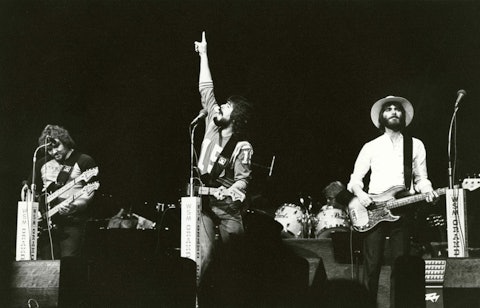
Alabama makes its Grand Ole Opry debut, 1982.
-
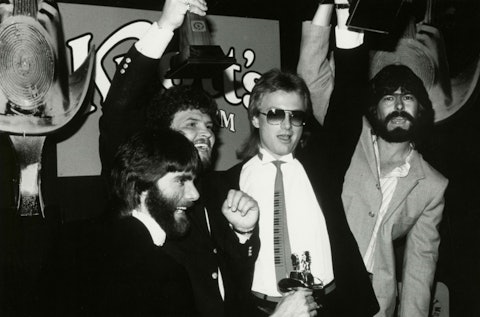
Alabama at the Academy of Country Music Awards, 1980s.
-
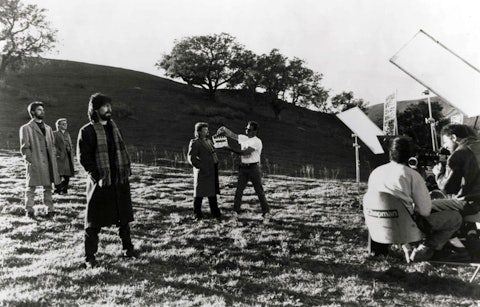
Alabama films its “Pass It on Down” music video, 1990. Photo by Mojgan B. Azimi.
-
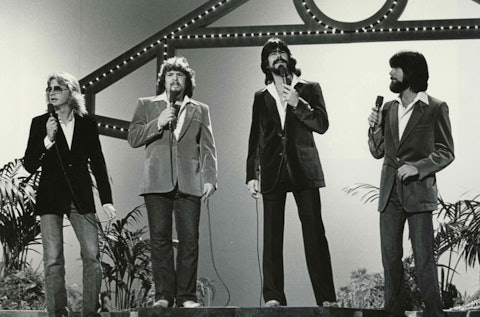
Alabama performs on the Barbara Mandrell & the Mandrell Sisters, 1981.
-

Alabama performs at the CMA Theater at the Country Music Hall of Fame and Museum, 2016.
-
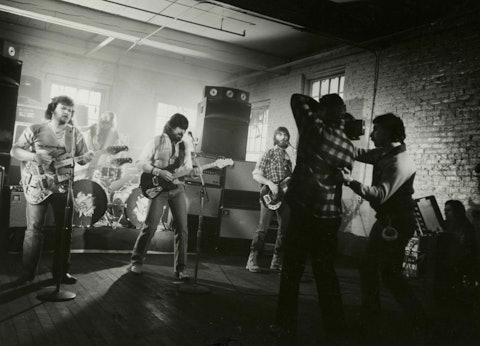
Alabama films a music video, 1980s.
-
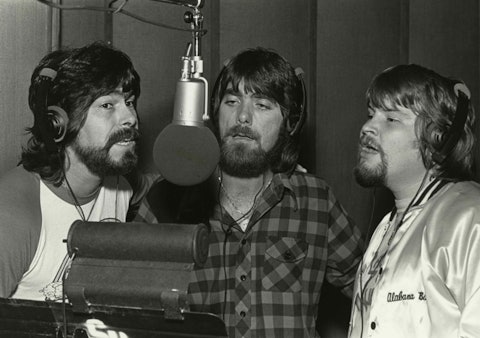
From left: Randy Owen, Teddy Gentry, and Jeff Cook of Alabama record vocals for their Feels So Right album at Nashville’s Music Mill studio, 1980.
-
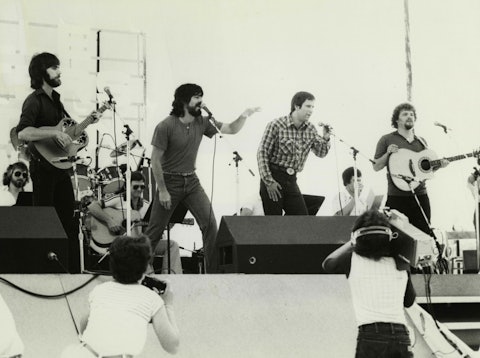
Alabama onstage, 1982. Photo by Don Putnam.
-
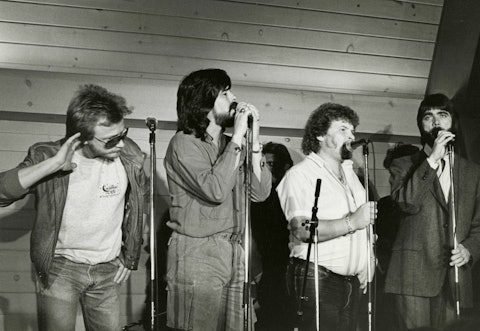
Alabama performs at the Country Music Hall of Fame and Museum’s original location on Music Row, 1984. Photo by Jim Frey.
-
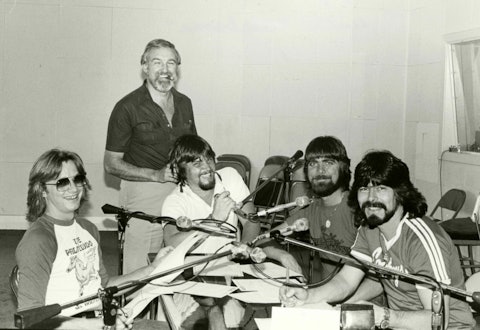
Alabama with radio host Ralph Emery (standing), taping an interview for the Ralph Emery Show, 1981.
A Retirement, Then a Reunion
In 2002, Alabama announced their upcoming retirement and spent much of 2003 and 2004 on tour, bidding farewell to their fans. The band members used the next several years to work on solo music projects before reuniting—minus Herndon, whose relationship with Cook, Gentry, and Owen was strained and who had been sued by his former bandmates in 2008—in 2011, for a charity concert benefiting Alabama tornado victims. That same year, Brad Paisley featured the band on his #1 song “Old Alabama,” which nods to several of Alabama’s hits.
Alabama resumed touring in 2013, for their fortieth anniversary. They also released a tribute album, featuring artists including Jason Aldean, Florida Georgia Line, and Trisha Yearwood, that year, then released their first album of new material since 2001, Southern Drawl, in 2015. Two years later, Cook announced that he would reduce the number of shows he plays each year due to his diagnosis with Parkinson’s disease.
—Geoffrey Himes
Adapted from the Country Music Hall of Fame® and Museum’s Encyclopedia of Country Music, published by Oxford University Press



